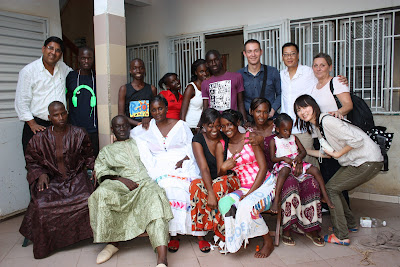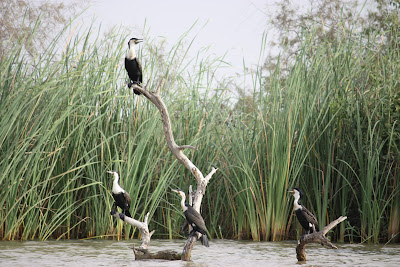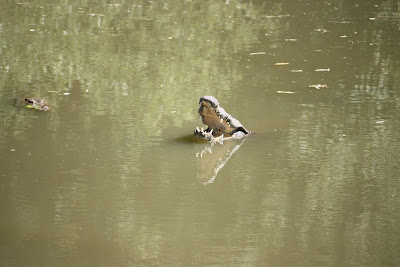One of the key tenets of the IBM Corporate Service Corps (#IBMCSC) program is to provide participants with full immersion while deployed in-country, for a truly authentic experience. For example, we live amongst the people in lodgings consistent with the local culture. There is no tie to IBM's standard corporate travel policies and the amenities are not judged on Western standards. The only criteria is safety.
In today's blog I'd like to paint a picture of the culture in #Senegal that we've seen firsthand as part of this immersive experience. This cultural awareness is critical as we approach the mid-point of our month-long assignment. We have spent the last 2 weeks interviewing and researching the business operations of our host organization
Agrécol Afrique, and as we complete our synthesis of the solution requirements, we are now beginning to formulate our initial recommendations. Our objective is to deliver a strategic plan that will define a go-to-market strategy that will help transition the organization from a donor-dependent NGO, to a for-profit sustainable social enterprise. Currently as an NGO, they book revenue solely from services provided to organic farmers, but by next year, they hope to invest fully in farming and distribution operations and book revenue from organic products sold. Simultaneously then, we need to recommend a high-level supply chain strategy. Underpinning both the GTM and supply chain strategy, is a need to migrate to a collaborative, cloud-based solution (Google Apps) for managing data and documents, so that they can scale in the short to medium term. Eventually they will need at least a basic ERP solution. Our final recommendations will no doubt jumpstart a challenging transformation and change management issues will appear at every step. And we will have to take into account the many cultural considerations.
We have been gleaning insights into that in our daily interactions at the office, around town, and on weekends as we explore other parts of the country.
1. People - I have written of teranga in
previous posts and that, without a doubt best summarizes the common man and woman here in Senegal. Never before have I met a more hospitable culture. Last Friday we celebrated Tabaski, the 3 day Muslim holiday. We were strangers, foreigners, even Catholics, welcomed in the homes of Muslims.
 |
| The family and home of our client, M. Souleymane Bassoum |
2. Language - All business is conducted in French, and while my French has been useful around town, having completed French Immersion only until Grade 6, I lack the vocabulary to effectively conduct business. I of course knew this from my days working in Paris and Nice for ILOG, so in the absence of a translator and team members from India and Japan, our team has been partially handicapped in this respect. While French is predominantly spoken in the office, the other key language utilized is Wolof. Unfortunately, so far, the only Wolof I have been able to retain is
asalamu aleikum, an important greeting meaning "peace be with you".
3. Dining - Generally as foreigners, for food safety we have been relegated to continental cuisine served at exorbitant prices. I for the most part have avoided the burgers, pizzas and pastas, instead opting for local fare to get a taste of local ingredients and spices as much as possible. As such I have been eating a lot of fish (grouper, sea bream, threadfin, monkfish, and tuna), chicken, and beef, which are often served grilled. But the highlight of my culinary experience to date, has been the Tabaski celebration at my host's home, and the delicious lamb ribs his wife and daughters prepared for us. Fortunately for our subteam in Senegal, we've also been blessed with the opportunity to dine at our host's organic restaurant every day for lunch. This restaurant caters in local Senegalese dishes, and we have been blown aware by the freshness, tastiness and simplicity of the various rice dishes complemented by fish, beef, or chicken and vegetables, and served with either an onion-based (yassa) or tomato-based (domado) sauce. There is actually one more traditional peanut-based sauce (maf
é) available, but we have been advised to avoid it. Our lunches have also exposed us to several traditional Senegalese fruit juices: bouye, from the fruit of the baobab tree, bissap, from the flowers of the hibiscus tree, and ditakh, from the fruit of the Senegalese Detak tree. The latter, fortunately for us, is currently only in season during our stay!
 |
| Culinary collage of my gastronomic adventures in Senegal |
4. Telecommunications - Everyone carries a cell phone (in many cases, one for every carrier to minimize out-of-network surcharges when calling friends on different plans) and hawkers line the streets selling prepaid cards. This is a cash-based society and nobody has a subscription plan. Interestingly, there has been very limited adoption of smartphones to date. 3G is available, but generally the internet is highly unreliable in Senegal. At the office, the DSL routinely goes down for hours at a time! Today it was down at 10:30 am and was still unavailable when we left at 6 pm. Imagine the outcry if this happened in the US.
5. Public Transportation - This sector is in extremely poor shape. All taxis and buses on the street seem to be from a by-gone era. None seem newer than 30 years and are all poorly maintained - fender benders go unrepaired, upholstery is torn, cushions are worn, and often time windows and doors do not operate. Taxis and buses are often seen broken down on the side of roads. In fact, we had our own very unforgettable experience last night, as we found ourselves stuck on the side of a secondary road, our private van/bus having broken down on our return trip from the Pink Lake (a naturally occuring body of salt water occuring inland.)
 |
| Another broken down taxi... |
5. Commerce - What got us in that predicament to begin with is an interesting study in how business is conducted in Senegal. To give the full context, I need to start with what happened last weekend. Our handler from CDC Solutions, the NGO on the ground managing our project, arranged with a local tour company to bring us to Saly, a resort on the coast. We as a team had agreed on accomodations for the weekend at a resort named Neptune Village. When we showed up in Saly, however, we were brought to another resort named Plein Sud. In short, it was a dump. We were told we would be 15 meters from the beach, and that we'd have 7 villas. None of that matched the description. We incidentally had a link to the villa's website and had an expectation going in of where we would be staying. Yet the tour guide insisted everything was correct, clearly oblivious to the fact that he was dealing with 14 top performers from IBM. He continued to lie and lie and lie, before admitting that he booked us there because he received the deposit one hour too late from our CDC handler. Caught in a web of lies, I found it very curious how he could continue to appear as if nothing was wrong the entire weekend! We unfortunately were dependent on him for our ride home so we needed to keep things amicable, however we refused to pay the amount we had agreed upon for Neptune Village. Somehow, I suspect in his bait and switch, he was hoping to pot the difference, and I'm sure he still made a profit from the 50% deposit we put down on Neptune Village.
Clearly a very bad experience, so it was a great surprise to hear that our CDC handler once again booked the same tour guide to bring us to the Pink Lake yesterday! This would never happen in the US, where customers have a choice and companies live and die by customer service. The tour guide showed up with a van not even large enough to carry us all. Now I must say that we had one of the most enjoyable experiences so far on our trip when we arrived at the Pink Lake - splashing in the Altantic ocean in one of the most spectacular beaches I have ever seen, riding quads through the sand dunes, and floating effortlessly on our fronts and backs in the Pink Lake. But things would take a turn for the worse, at least momentarily...
 |
| The Pink Lake, until 2007, the finish line of the Dakar Rally (formerly Paris-Dakar Rally) |
The tour guide advised us we would be taking a shortcut on the way home, one that would shave off an hour. His idea was to cut straight back to the highway instead of driving around the Pink Lake as we had done earlier in the day. We were skeptics, and things got pretty dicey as the driver drove us into a dead end. From there every few miles he'd have to stop and ask if we were heading in the right direction. At dawn the "road" and any driveway was pretty indistinguishable, as both are basically tire tracks in the desert! What's more, we were offroading in a tour van, which likely contributed to what happened next. We made it to the highway, and were told it would be 45 minutes to our hotel from there. Shortly after that, the headlights died, the electrical systems went dark, and the van stalled. We were 20 km from the hotel, stuck on the side of the road in the pitch dark. And our fate was in the hands of a man who had lost all credibility with us the week before...
6. People (reprise) - We were helpless, 14 IBMers sitting ducks in a foreign country in the dead of night. But what happened next would seem miraculous in almost any other country. A bus going the other direction - with people on it - saw us and stopped. The people on the bus got off, allowing the bus to save a group of foreigners and take them on to their final destination. This has become the defining moment in our minds for the good people of Senegal. And as we looked up into the night sky, I don't think any of us had ever seen so many stars. We saw every constellation just as the ancient Greeks would have centuries ago, giving a whole new meaning to
thanking our lucky stars.
 |
| Alhamdoullah - meaning Praise to Allah - is printed on the front of all buses in Senegal and this couldn't have been more appropriate on this night |
The postings on this site are my own and don't necessarily represent IBM's positions, strategies or opinions.


























































